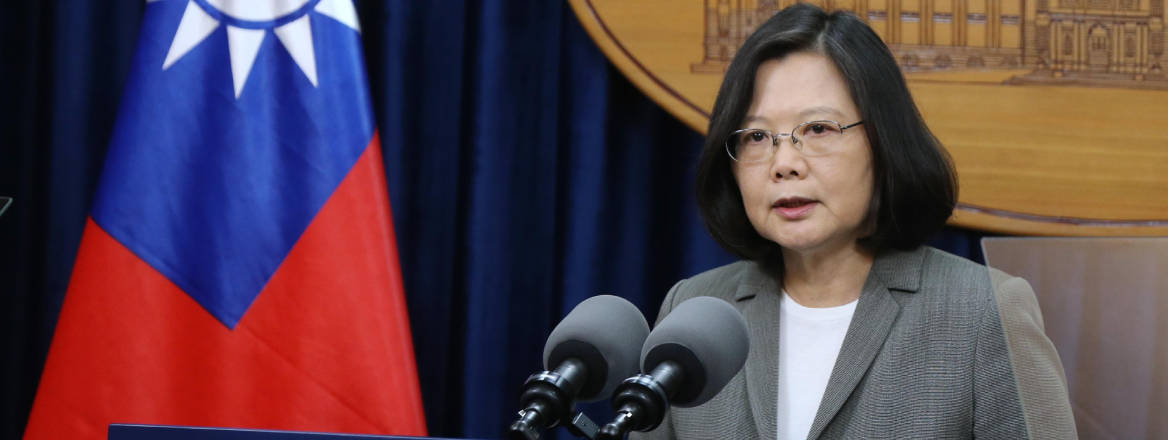Taiwan Elections: Reactions to the DPP’s Win
Taiwanese President Tsai Ing-wen’s decisive electoral victory is a serious rebuff to communist China and President Xi Jinping.
First Hong Kong, now Taiwan. For Beijing, the elections in both territories have left the Chinese Communist Party (CCP) with the problem of explaining to its people why those who are part of the ‘Chinese nation’ (zhonghua minzu, a phrase with heavy inclusive and political meaning) are in effect voting against Xi Jinping’s much-used concept of a ‘community of shared future for mankind’ – or in its more concentrated and local version, ‘One Country, Two Systems’ (OCTS).
So far, the CCP has resorted to ungentlemanly commentary centring on Tsai’s supposed practice of buying votes, or has ascribed the Taiwanese electoral results to deceit, intimidation and ‘dirty methods’. Foreign hands – as ever – are allegedly lurking behind trouble: as Xinhua, China’s official news agency put it, ‘Obviously, this internal election in Taiwan was greatly manipulated by dark external forces’.
The victory of Tsai Ing-wen in the Taiwanese presidential elections and of her Democratic Progressive Party (DPP) in the elections to the Legislative Yuan, Taiwan’s parliament, on 11 January, was decisive. Tsai received 57% of the popular vote, and in the Legislative Yuan, the DPP took 61 out of 113 seats – an overall majority over all the other parties. Control of the Legislative Yuan is crucial: without it, the opposition Nationalist Party (KMT) would be able to block the DPP’s programme.
Tsai’s victory only became expected in the last few months. Earlier in 2019, as Tsai’s popularity deflated (discontent centred on labour laws, pension reform, energy, low wages and gender issues), there was even talk of a challenge to her nomination as presidential candidate. What turned things around for Tsai was the KMT’s support for closer relations with the mainland, and even, on the part of some KMT candidates, for unification. Thus, ironically, Xi helped Tsai win.
Xi’s rhetoric has not helped his cause. His speech on 2 January 2019 on ‘reunification’ was widely seen in Taiwan as hard-line. This was reinforced by the language on Taiwan in the Decision of the 4th Plenum of the Communist Party’s Central Committee in October, with its emphasis on the OCTS concept. Nor does the reality of Xi and of his rule inside China endear itself to Chinese people outside his direct control. Creeping totalitarianism – with the Party intruding deeply into most aspects of life, education, culture, religion, the internet, freedom of speech and thought, the police panopticon’s assault on privacy, and the background to unrest in Hong Kong – is deeply unattractive to the Taiwanese people. They are proud of their new democracy, values, culture and identity, and a majority do not see themselves as Chinese.
How will the CCP react?
Xi Jinping portrays himself as a strong leader – he is not a politician for turning. Thus, we can expect more of the hard stance which has marked his dealings with the DPP since 2016. But the option of the use of force to seize Taiwan is unlikely in the next decade, even though Xi and other leaders have explicitly not ruled it out. Success in seaborne invasions is by no means guaranteed. More importantly, even if the US does not come to the help of Taiwan, or could not do so within a relevant timeframe, the mounting of an invasion or the use of force would lead to possible sanctions against China and falls in investment and trade. In the absence of an adequate social security net, the resulting unemployment on the mainland would give rise to protests aimed at the Party. That is not a risk Xi is likely to take.
Still, we shall see more People's Liberation Army exercises, incursions by air and naval craft, designed to sap the will of the Taiwanese people and convince them that (re)unification is inevitable. We shall also see more United Front Work Department activity, including attempts to interfere and influence, capture local elites, infiltrate the media and stalk the internet. There will also be more pressure on Taiwan in the international arena (for example, blocking participation in international organisations and suborning of its remaining diplomatic relations). On the more positive side, we are likely to see efforts to entice Taiwanese youth into contact with China, more incentives to business and more privileges for Taiwanese people on the mainland (adding to the 31 measures announced in February 2018 and the 26 additional measures announced in November 2019).
How will the DPP react?
One CCP newspaper commented that President Tsai’s win may encourage her and her DPP ‘to take the extreme path’. She hasn’t, and they won’t. While trying not to provoke Beijing, she will quietly work to reinforce Taiwan’s democracy and identity. Tsai will continue to raise Taiwan’s defence spending and bolster its measures against potential cyber attacks. The ‘southbound’ policy aims to reduce the dependence on the mainland and encourage businesses either to return to Taiwan or move elsewhere in Asia. Tsai will work to gain more support from the US and other liberal democracies, and she will pursue her social programmes, the more progressive of which include gender and sexual equality.
But there are measures being contemplated, which, while not intended to provoke the CCP, will be far from welcome to Beijing. The DPP may introduce legislation to ensure that any future negotiations with the mainland must be put to the Legislative Yuan in advance and that any confirmation of the results would have to pass with a supermajority, and after a referendum. Other considerations are a strengthening of the criminal code to increase penalties for supplying intelligence to the mainland; and there may be a ban on running media outlets imposed on big companies, which are seen as aligning their business interests with Beijing.
What might the effect be on the UK and Europe?
In its 2018 white paper on the EU, the CCP put out a harsher line than hitherto: ‘There should be no official contact or exchanges in any form’, and no official agreements should be signed or official institutions established. Over the coming years, we can expect an increase of pressure aimed at further isolating Taiwan. The chipping away has started, in classic CCP style, by targeting smaller and weaker countries, mainly in the Middle East and Latin America. Once it begins to build a new path post-Brexit, the UK will be an important target for the CCP.
Businesses in the UK and Europe can also expect more – and possibly deeper – versions of the bullying of the past years, when among other things they were threatened over how they referred to Taiwan on their websites. The sorts of pressure brought to bear on Cathay Pacific and HSBC over Hong Kong may be played out in the Taiwan context.
The CCP frequently declares that the tide of history will lead to (re)unification with Taiwan. But the tide is turning in the opposite direction: the Taiwanese people, seeing what Xi’s ‘Chinese Dream’ entails, particularly in Hong Kong, are voting against ‘sharing a common destiny’ (the phrase was first used about Taiwan in 2007 by Xi’s predecessor, Hu Jintao).
This will increasingly put the UK and other liberal democracies on the spot, as our political, economic and value systems diverge from those of the CCP. Are we to subordinate that divergence and our democratic principles to a perceived ‘prosperity’ agenda, prioritising economic benefit (our exports to China are 10 times greater than to Taiwan)? It is the same dilemma just faced by Taiwanese voters, in a more direct and sharp form. In its most uncompromising form, it is also the dilemma facing Hong Kong. If, in September’s Legislative Council elections, democratic parties receive large-scale support, Xi will have a further problem in explaining why the OCTS concept is so deeply unattractive.
The views expressed in this Commentary are the author's, and do not represent those of RUSI or any other institution.
WRITTEN BY
Charles Parton OBE
RUSI Senior Associate Fellow, International Security


